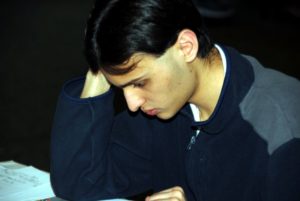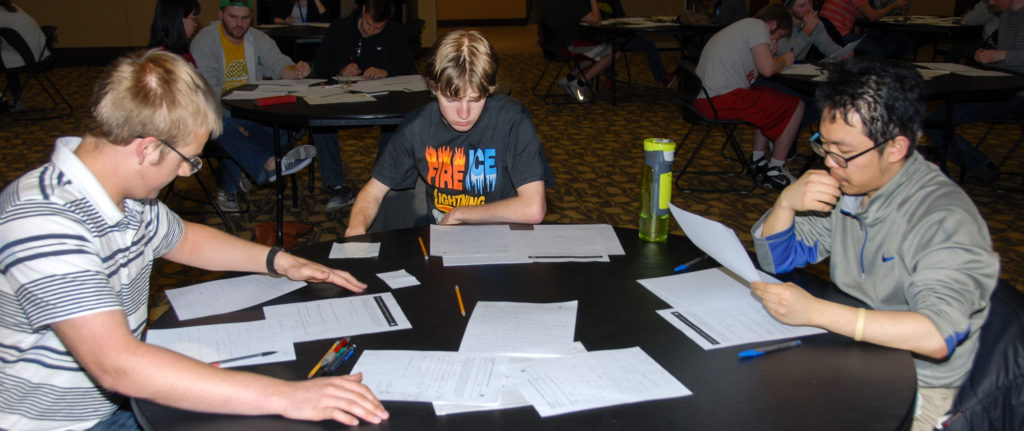One of the most impressive things Washington University in St. Louis students do each academic year is sit for the Putnam Competition, an annual competition that tests the mathematical ingenuity of undergraduate students.

This time, 4,275 students from 554 colleges and universities throughout North America participated in the contest, which is held each year on the first Saturday in December.
The Washington University team finished eighth overall, earning an honorable mention, a distinction accorded only the top 10 teams.
The three members of the Washington University team were Zhengdao Chen and Philip Bonneville, both juniors majoring in mathematics in Arts & Sciences; and Anthony Grebe, a senior majoring in mathematics and in physics in Arts & Sciences.
Grebe was the university’s top scorer, with a rank of 51.5, which also earned him an honorable mention as an individual.
The Putnam consists of two three-hour sessions, during each of which competitors work on six problems.
The difficulty of the problems is graduated, said John McCarthy, the Spencer T. Olin Professor in Arts & Sciences, who helped coach this year. “They range from hard to incredibly hard,” McCarthy said.
The median score on the exam is zero, McCarthy said. That means most people who sit for it make no headway on any of the problems.
To earn his rank, Grebe solved five of the 12 problems and earned a small amount of partial credit on a sixth.
“I was excited when I learned my score,” Grebe said, “since this is the best I’ve done on the Putnam during my four years here. I’m also happy about the performance of the team as a whole. Our team ranking was the best we’ve received in my time at Washington University.”
“The group of students who go out for the Putnam is not very big,” said Xiang Tang, professor of mathematics, who also coached the team. “But every year, we have a group of students who are very enthusiastic and work really hard.”
The resident expert
Washington University’s expert on the Putnam is Carl Bender, the Konneker Distinguished Professor of Physics, who has coached the students every year he has been on campus.
“The problems are incredibly clever and beautiful,” Bender said.
“Here’s one of my favorites: You have a piece of paper that is infinite in all directions and three colors: red, blue and green. Can you color each point on the piece of paper in such a way that if two points are one inch apart they are not the same color?
“That’s it,” Bender said. “That’s the problem. I start with it because it shows the students they’re not being tested on their knowledge of higher mathematics but rather on their creativity.”
Bender said the flash of insight that comes when a solution is suddenly seen is such a powerful reward that it becomes addictive.
“Many people view mathematics as a collection of formulas and standard procedures used to solve specific types of problems,” Grebe said. “This is true for some applications of math, but the really neat part is being able to look at a problem unlike any that you have ever seen, and think about methods you could try to put together to solve the problem.
“It’s really satisfying when you see the trick that leads to the solution,” Grebe said.
Ironically, none of the three faculty coaching the Putnam this year competed themselves as undergraduates. Tang and McCarthy did not study in North America, and Bender was pursuing competitive chess on the weekends. He wasn’t aware of the Putnam.
Can the coaches solve the Putnam problems? Tang said he can manage the easy ones, and some of middling difficulty, but he has to fight really hard to solve the harder ones and succeeds only with luck.
McCarthy said he can do some but not all. “But I have more experience than the undergraduates, so that gives me a leg up. Carl could certainly do better than me.”
“Ordinarily I take the exam with the kids,” Bender said, “because it’s really interesting and fun. I can solve most of the problems, but rarely can I solve every last problem in the time allowed.”
Almost all the Putnam problems and their solutions are available on the Internet.
Dominating the statewide competition
Washington University also retained its dominance of the Missouri Collegiate Mathematics Competition, held April 7-8 on the campus of Missouri Western State University in St. Joseph, Mo.
The team scored a perfect 100 to tie with a team from Missouri Southern State University for first place among 31 teams from 19 schools. Team members were Matt Ehren, a first-year student in Arts & Sciences; Keunjae (Harry) Go, a senior in Arts & Sciences; and Alex Mason, a sophomore in Arts & Sciences.

A second Washington University team consisting of Changming Xu, a first-year student in Arts & Sciences; Thomas (Ted) Meador, a junior in Arts & Sciences; and Stella Schindler, a sophomore in Arts & Sciences, placed fourth with a score of 94.
The faculty sponsors for the Missouri competition this year were Ron Freiwald, professor of mathematics, and Blake Thornton, coordinator of lower-division teaching in the Department of Mathematics.
Problems and solutions from the competition are available in the competition archive.
Back to the question posed by Bender. The answer, by the way, is no. But the question is: How can you show it must be no?